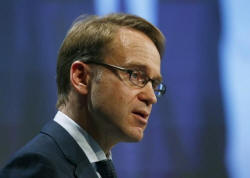|
 Bundesbank
chief warns of zero-rate impact on banks Bundesbank
chief warns of zero-rate impact on banks
 Send a link to a friend
Send a link to a friend
[February 24, 2016]
By John O'Donnell
FRANKFURT (Reuters) - Bank profits will
shrink if rock-bottom interest rates stay in place for too long, the
head of Germany's central bank warned on Wednesday, signaling that he
favors an eventual change in tack.
|
|
 The remarks from the Bundesbank's influential president, Jens
Weidmann, illustrate how seriously Germany is taking the fallout
from years of low borrowing rates after a recent crash in bank
stocks sucked in the country's flagship Deutsche Bank <DBKGn.DE> . The remarks from the Bundesbank's influential president, Jens
Weidmann, illustrate how seriously Germany is taking the fallout
from years of low borrowing rates after a recent crash in bank
stocks sucked in the country's flagship Deutsche Bank <DBKGn.DE> .
"The low interest-rate environment particularly weighs on banks'
earnings potential," Weidmann told journalists, referring to the
market slump.
"The longer the low-interest-rate phase stays, the steeper interest
rates fall, the ... smaller banks' profit," said Weidmann, who also
sits on the European Central Bank's decision-taking Governing
Council.
Early next month, ECB governors will meet to decide whether to
loosen monetary policy further, for instance, by extending a 1.5
trillion euro money printing scheme to buy government bonds or by
cutting interest rates further.

A cut to the deposit rate, which translates into a charge on banks
that park money with the ECB, would penalize banks.
Weidmann referred to a survey of German banks that concluded they
would see pre-tax profits shrivel by 25 percent by 2019 as a result.
Should low interest rates remain in place until 2019, he said,
profits could fall by up to half. Further cuts to borrowing rates
during this time would make their results worse still.
The former adviser to German chancellor Angela Merkel, saying that
he hoped interest rates would eventually rise again, played down any
threat of deflation or falling prices and predicted that a modest
economic recovery would continue.
[to top of second column] |

Falling price inflation is generally considered an economic alarm
bell and is typically used as a trigger for ECB action. In talking
down such a problem, Weidmann is also playing down the need for any
action.
He also voiced scepticism about the proposal to scrap the 500-euro
note, saying that Germans still wanted to be free to pay in cash.
"It would be fatal if the impression were to be created ... that the
discussion about the scrapping of the 500-euro note ... was a step
towards ending the use of cash generally."
(Reporting by John O'Donnell; Editing by Mark Heinrich)
[© 2016 Thomson Reuters. All rights
reserved.] Copyright 2016 Reuters. All rights reserved. This material may not be published,
broadcast, rewritten or redistributed.
 |